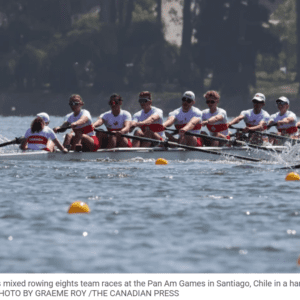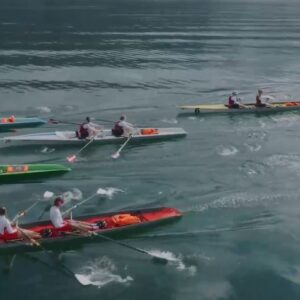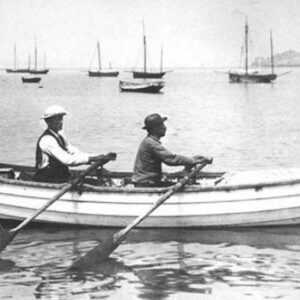Think about Coastal Rowing and the LA 2028 Olympics, and now imagine the worst-case scenario – imagine that the IOC and the local OC in the U.S. decide not to include the beach sprint venue in the Games. And as a result, Coastal Rowing not becoming Olympic. What would happen to our great sport? Our prediction: nothing… The interest in our sport will continue to grow, and more events will gradually be established. We could only imagine one thing: Beach sprints will not be so popular anymore. But let’s have some background information about the current situation.
Coastal rowing is currently not an Olympic discipline, but has been recognized by the International Olympic Committee (IOC) as a separate sport since 2020. However, it has not yet been included in the Olympic Games program. The decision to include a new discipline in the Olympic program is made by the IOC and depends on various factors such as popularity, global reach and infrastructure requirements. So, although coastal rowing has gained popularity in recent years, it remains to be seen whether or not it will be included in the Olympic program in the future.
Beach Sprint promotion

There have been discussions about the inclusion of coastal rowing in the Olympic Games for some time, and advocates of the sport are campaigning for this goal. For example, the World Rowing Federation (FISA) has been advocating for beach sprints for some time and is actively seeking the sport’s inclusion in the Olympics. However, it could be some time (likely May / June 2023) before the IOC considers including this sport as an official discipline. Have a look at our last article on the subject.
What makes Coastal Rowing so interesting?
Coastal rowing is gaining interest for several reasons.
First, it offers a unique and unparalleled experience compared to traditional rowing on flat water. Coastal rowing takes place on open water, usually an ocean or sea, where rowers must cope with changing conditions such as waves, currents, and wind. This makes the sport more challenging and, most importantly, more exciting for both participants and spectators. Not to mention, the excitement leads to better ratings on TV and clicks in other media. Especially the sprints on the beach are extremely exciting to watch. Without wanting to deny the excitement of traditional rowing here, but the crushing of boats in the waves, the fight around the buoy and simply the unpredictability of the events make a broadcast exciting, especially for non-rowers or recreational rowers. And it is precisely this excitement and freshness that is sought after in the Olympic Games in particular. After all, this led to the inclusion of skateboarding and breakdancing.
Second, coastal rowing is more accessible than traditional rowing because it does not require a special body of water or infrastructure such as a boathouse or dock. This makes it easier to get into the sport, especially for those who do not have access to a traditional rowing facility.
Third, coastal rowing is often considered a community-oriented sport. It is typically practiced in teams, and the nature of the sport means that rowers must rely on each other to complete and finish the course. This fosters a sense of camaraderie and teamwork among participants.
Finally, coastal rowing is also growing in popularity as it becomes better known through international competitions and events. The World Rowing Coastal Championships have been held annually since 2006, and in recent years the sport has received more recognition and support from organizations such as the International Olympic Committee and the World Rowing Federation.

Imagine, however, that Coastal Rowing does not become an Olympic discipline.
What happens if Coastal Rowing does not become an Olympic discipline? We assume that nothing really happens. The sport will neither cease to exist nor become less popular. Coastal rowing will continue to be practiced by enthusiasts and athletes around the world, and competitions will continue to be held at local, regional and international levels. There are already several international competitions dedicated to coastal rowing, such as the World Rowing Coastal Championships, the European Coastal Rowing Championships, and many local Coastal Rowing Cups. These events attract rowers from different countries and offer athletes the opportunity to compete and demonstrate their skills.
In addition, coastal rowing can continue to grow and develop as a sport, with a focus on expanding its reach and popularity among the general public. This can be achieved through increased exposure in media coverage and promotion of the sport at the local and national levels.
Overall, while inclusion in the Olympic program is a significant achievement and opportunity for any sport, it is not the only measure of success or significance. Coastal rowing’s long-distance regattas will definitely continue to evolve outside the Olympic Games and continue to provide a unique and exciting experience for participants and spectators alike.







